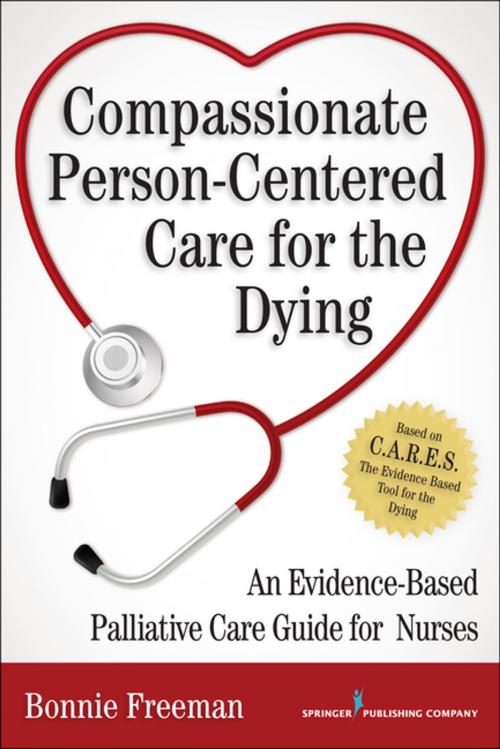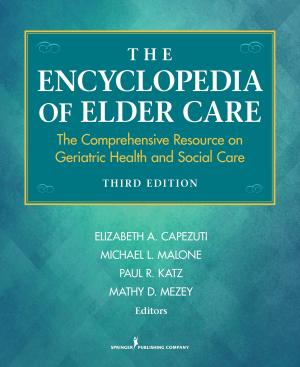Compassionate Person-Centered Care for the Dying
An Evidence-Based Palliative Care Guide For Nurses
Nonfiction, Health & Well Being, Medical, Nursing, Oncology & Cancer, Medical & Surgical, Home & Community Care| Author: | Bonnie Freeman, RN, DNP, ANP, ACHPN, Tracey DasGupta, Margaret Fitch | ISBN: | 9780826122483 |
| Publisher: | Springer Publishing Company | Publication: | February 23, 2015 |
| Imprint: | Springer Publishing Company | Language: | English |
| Author: | Bonnie Freeman, RN, DNP, ANP, ACHPN, Tracey DasGupta, Margaret Fitch |
| ISBN: | 9780826122483 |
| Publisher: | Springer Publishing Company |
| Publication: | February 23, 2015 |
| Imprint: | Springer Publishing Company |
| Language: | English |
A milestone resource for palliative care nurses that facilitates evidence-based compassionate and humanistic care of the dying
"A valuable contribution to the evolving field of palliative nursing care. It is authored by a model for this field, Bonnie Freeman, and brings to the bedside what her practice embodies--evidence-based clinically expert care...The CARES tool is a long-needed resource and we are all grateful to the author for moving her passion to paper. It will touch the lives and deaths of patients, families, and the nurses who care for them."
--Betty Ferrell, PhD, RN, MA, FAAN, FCPN, CHPN
Professor and Director, Division of Nursing Research and Education
City of Hope National Medical Center
From the Foreword
This groundbreaking reference for palliative care nurses is the first to provide realistic and achievable evidence-based methods for incorporating compassionate and humanistic care of the dying into current standards of practice. It builds on the author's research-based CARES tool; a reference that synthesizes five key elements demonstrated to enable a peaceful death, as free from suffering as possible: comfort, airway management, management of restlessness and delirium, emotional and spiritual support, and selfcare for nurses. The book describes, step by step, how nurses can easily implement the basic tenets of the CARES tool into their end-of-life practice. It provides a clearly defined plan that can be individualized for each patient and tailored to specific family needs, and facilitates caring for the dying in the most respectful and humane way possible.
The book identifies the most common symptom management needs in dying patients and describes, in detail, the five components of the CARES paradigm and how to implement them to enable a peaceful death and minimize suffering. It includes palliative care prompts founded on 29 evidence-based recommendations and the National Consensus Project for Palliative Care Clinical Practice Guidelines. The resource also addresses the importance of the nurse to act as a patient advocate, how to achieve compassionate communication with the patient and family, and barriers and challenges to compassionate care. Case studies emphasize the importance of compassionate nursing care of the dying and how it can be effectively achieved.
Key Features:
- Provides nurses with a clear understanding of the most common needs of the dying and supplies practical applications to facilitate and improve care
- Clarifies the current and often complex literature on care of the dying
- Includes case studies illustrating the most common needs of dying patients and how these are addressed effectively by the CARES tool
- Based on extensive evidence as well as on the National Consensus Project for Palliative Care Clinical Practice Guidelines
A milestone resource for palliative care nurses that facilitates evidence-based compassionate and humanistic care of the dying
"A valuable contribution to the evolving field of palliative nursing care. It is authored by a model for this field, Bonnie Freeman, and brings to the bedside what her practice embodies--evidence-based clinically expert care...The CARES tool is a long-needed resource and we are all grateful to the author for moving her passion to paper. It will touch the lives and deaths of patients, families, and the nurses who care for them."
--Betty Ferrell, PhD, RN, MA, FAAN, FCPN, CHPN
Professor and Director, Division of Nursing Research and Education
City of Hope National Medical Center
From the Foreword
This groundbreaking reference for palliative care nurses is the first to provide realistic and achievable evidence-based methods for incorporating compassionate and humanistic care of the dying into current standards of practice. It builds on the author's research-based CARES tool; a reference that synthesizes five key elements demonstrated to enable a peaceful death, as free from suffering as possible: comfort, airway management, management of restlessness and delirium, emotional and spiritual support, and selfcare for nurses. The book describes, step by step, how nurses can easily implement the basic tenets of the CARES tool into their end-of-life practice. It provides a clearly defined plan that can be individualized for each patient and tailored to specific family needs, and facilitates caring for the dying in the most respectful and humane way possible.
The book identifies the most common symptom management needs in dying patients and describes, in detail, the five components of the CARES paradigm and how to implement them to enable a peaceful death and minimize suffering. It includes palliative care prompts founded on 29 evidence-based recommendations and the National Consensus Project for Palliative Care Clinical Practice Guidelines. The resource also addresses the importance of the nurse to act as a patient advocate, how to achieve compassionate communication with the patient and family, and barriers and challenges to compassionate care. Case studies emphasize the importance of compassionate nursing care of the dying and how it can be effectively achieved.
Key Features:
- Provides nurses with a clear understanding of the most common needs of the dying and supplies practical applications to facilitate and improve care
- Clarifies the current and often complex literature on care of the dying
- Includes case studies illustrating the most common needs of dying patients and how these are addressed effectively by the CARES tool
- Based on extensive evidence as well as on the National Consensus Project for Palliative Care Clinical Practice Guidelines















